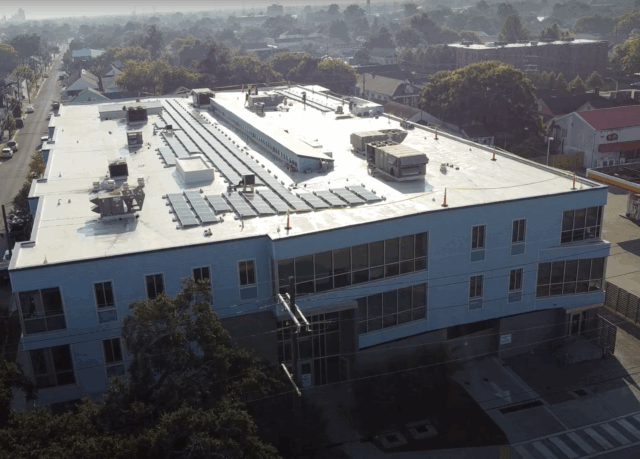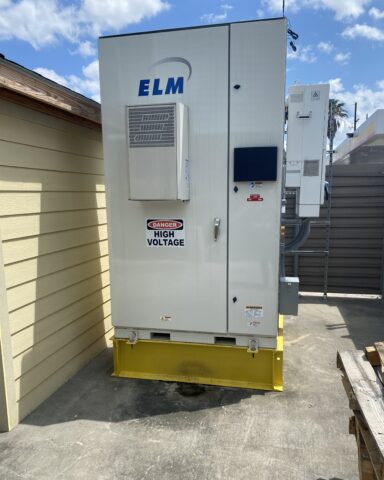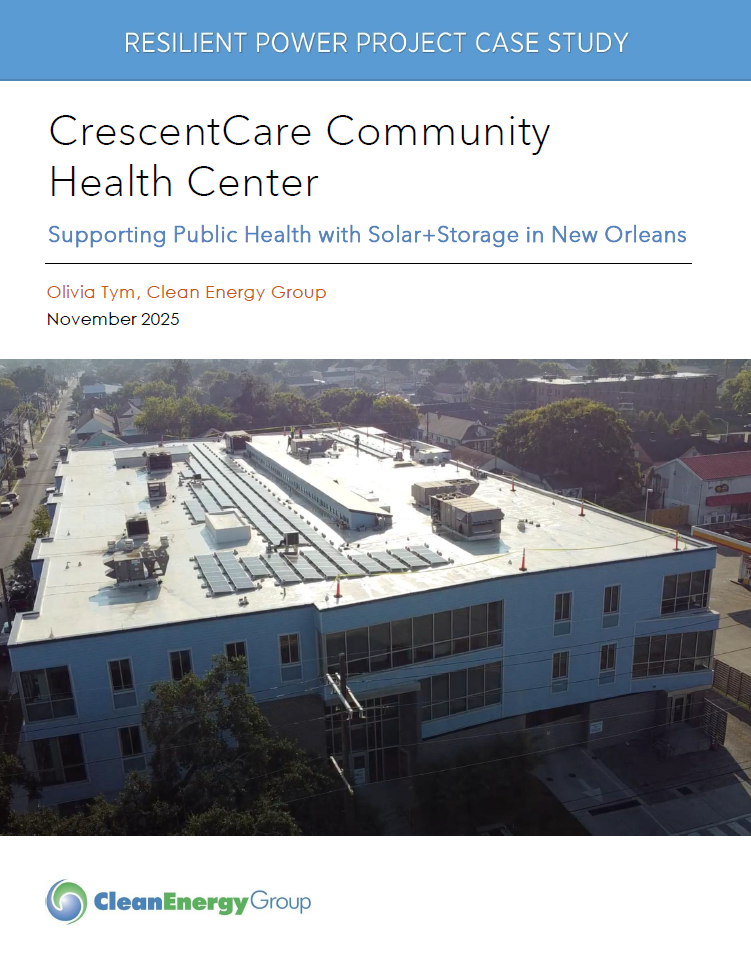CrescentCare Community Health Center
New Orleans Community Health Center, CrescentCare, Installs Resilient Power Hybrid System to Ensure Continuity of Care in the Event of an Outage

Solar array at CrescentCare Health Clinic. Photo Credit: Together New Orleans.
When Hurricane Ida landed in Louisiana in August 2021, it brought with it massive destruction, decimating the area’s energy infrastructure. Over 1 million residents lost power, some for weeks, resulting in a public health crisis when medically vulnerable residents could not access refrigeration for temperature-regulated medication like insulin, electricity to power medical equipment, or basic health services.
CrescentCare is one of the largest community health centers in New Orleans, with two locations within the city. Community health centers, also known as Federally Qualified Health Centers, are a critical part of the healthcare safety net, serving low-income, uninsured, and underserved populations. During Hurricane Ida, the diesel generators at the St. Roch CrescentCare location failed, forcing the clinic to close and redirect patients to a secondary location that had an operating natural gas backup power system. For temperature-regulated vaccines and medication, CrescentCare turned to their redundancy plan, which was to transport cold storage to the facility of their nearby community partner. Unfortunately, their partner could not provide access to cold storage at their facility because their backup emergency diesel generators had also failed.
The CrescentCare closure and inability to transport and safely store medications and vaccines resulted in approximately $250,000 in losses. CrescentCare’s partner pharmacy, which is co-located in the St. Roch facility that lost power, estimated an additional product loss of $750,000, including refrigeration-dependent vaccines and medications. When CrescentCare was able to get the St. Roch on-site generators functional again, it faced steep hurdles in accessing diesel fuel due to supply chain interruption. Fuel shortages related to supply chain interruptions frequently occur following are a disaster, with available fuel often prioritized for hospitals and first responders.
CrescentCare’s experience during Hurricane Ida was especially challenging, but not unique. New Orleans ranks among the top 10 cities in the US for power outages from severe weather. Without access to local health care options during an emergency event and corresponding outage, residents in need of medical care must either wait for emergency support or travel to already inundated hospitals. Others will wait out the outage at home, a significant risk for those dependent on electricity for in-home medical equipment.
Solar+Storage for Resilient Power and Cost Savings
Following Hurricane Ida, CrescentCare invested in a 128-kilowatt solar array paired with a 220-kilowatt-hour lithium-ion battery storage system and a 500-kilowatt natural gas generator for their St. Roch location. The solar+storage system is designed to power the entire facility, including vaccine storage, pharmacy, IT infrastructure, and patient care areas, for no less than 4 hours. The battery storage provides an average of 9 hours of backup power, while the combined system with the generator averages 10 days of backup power. During periods of low solar generation (like cloudy days or evenings), the natural gas generator charges the batteries. Solar+storage is anticipated to support the entire building’s electric loads during regular grid operations. As a redundancy measure, CrescentCare ensured that cold storage for vaccines and medications had separate backup batteries to prevent loss of pharmaceutical and temperature sensitive supplies. These batteries are readily available and can be activated in the event that the solar+storage+natural gas system fails. As part of the system upgrade, CrescentCare chose to remove the existing 200-kilowatt diesel generator and gift it to a local community organization that didn’t have an existing source of backup power.
The healthcare sector is responsible for upwards of 17% of the global carbon footprint. CrescentCare’s solar+storage system not only enhances its resilience and ensures uninterrupted care during power outages, but it will also reduce the facility’s environmental impact.
Lessons Learned
CrescentCare, which had no prior resilient power engineering or project development experience, invested time and money into effectively handling the project management role to enhance emergency backup power systems. The system design required coordination between multiple vendors and subcontractors. The focus was to ensure that the solar+storage system was well-integrated with the natural gas generator. CrescentCare engaged the contractors that were originally involved in building the facility to ensure infrastructure designs were compatible with mechanical and electrical upgrades. The contractors’ deep knowledge of the building’s design meant they knew how to most efficiently accommodate the resilient power system (for example, by not needing to install an extra conduit). Throughout the process, CrescentCare had to ensure that its vendors were aware of the building's electrical makeup, gas line locations, mechanical and electrical plans, and the other vendors’ actions.
In pursuing this project, CrescentCare had hoped to install solar+storage in time to have reliable backup power before the upcoming hurricane season. However, supply chain delays and manufacturing issues caused them to miss that goal. The size of the system and how much energy was anticipated to be sent back to the grid required additional discussion with, and associated delays from, the utility.
CrescentCare’s experience underscores the importance of proactive planning and capacity building to ensure that a resilient healthcare system can continue serving patients during extreme weather events and intermittent grid failure.
Reliable Power Through Recent Outages
Commissioned in March 2024, the St. Roch CrescentCare Community Health Center is part of the first solar+storage powered resilience hub in the Gulf South. In the same month that the system was commissioned, New Orleans experienced a 2-hour grid outage, and the solar+storage system served the health center's entire load, resulting in no essential losses or interruptions in care. The solar+storage system also provided uninterrupted power during intermittent grid outages in January 2025.
The ability to operate during a power outage is hard to understate for community health centers, both for the value of life and maintaining services to the most vulnerable community members, in addition to the monetary value of staying operational and keeping medicines and vaccines temperature regulated. Following Hurricane Ida, CrescentCare and its partner pharmacy valued their combined losses at over a million dollars for vaccines, medications, and temperature sensitive testing alone. Solar+storage will help prevent future losses and is projected to save CrescentCare $24,000 annually through solar net-metering savings on their utility bill, offsetting utility costs by an average of 15-20%.
CrescentCare’s solar+storage system represents a major step toward strengthening the clinic’s operational resilience while also reducing its carbon footprint, setting a precedent for other healthcare facilities seeking to navigate the challenges of climate change and energy instability.
New Orleans First Community Lighthouse
With the installation of solar+storage, CrescentCare became New Orlean's first “Community Lighthouse.” The Community Lighthouse initiative, led by nonprofit organization Together New Orleans, supports community-serving organizations in developing and installing solar+storage systems to ensure continuity of services during an outage. To date, ten community-serving organizations in New Orleans have utilized solar+storage in becoming a Community Lighthouse.
While CrescentCare wasn’t a Technical Assistance Fund awardee, the project did receive Clean Energy Group support. Through a longstanding partnership with Together New Orleans, Clean Energy Group supported the CrescentCare solar+storage project through early advisory and coalition building support. Other major project contributors include the National Association of Community Health Centers CHARGE Partnership and Environmental Health teams, and a long-standing supporter of CrescentCare and the New Orleans Community, Direct Relief.
Photos
Click on the photos below to view full size with captions.
Installation Details
Year Commissioned
March 2024
Services Provided
Backup power, net metering
Supported Infrastructure
100% of St. Roch CrescentCare Community Health Center, including vaccine storage and a pharmacy. To extend the life of the system during an outage, the system can be directed to only power critical loads, such as refrigeration for medications and vaccines, HVAC, IT infrastructure (including electronic health records), elevators, pharmacy, food pantry, lab, and certain medical procedure areas.
Solar
128 kW
Storage
220 kWh lithium-ion battery
Additional Technologies
500kW natural gas generator
Total cost of solar+storage
$650,000
Estimated annual utility savings
$2,000 a month ($24,000 annually)
Duration of Backup Power
Battery storage alone will provide a minimum of 4 hours and an average of 9 hours of backup power. Without solar, the charged battery and natural gas generator provides a minimum of 6 and a half days and an average of 10 days of backup power.
Project Partners
CrescentCare, CHARGE Partnership, DirectRelief, Together New Orleans, Clean Energy Group
Funding
$650,000 grant from Direct Relief, Power Purchase Agreement for Solar
Integrating solar energy production with backup battery store supports our mission of providing quality healthcare for the most vulnerable in our community. With this enhancement to our backup generator power infrastructure, we can power all areas of our facility, sustaining critical healthcare services in the event of a power outage.
- Reginald Vicks RN MBA, Chief Operations Officer, CrescentCare Community Health Center
Associated Publication






